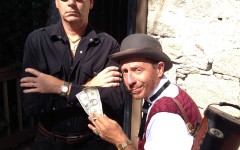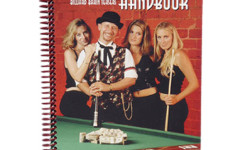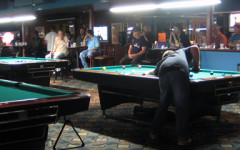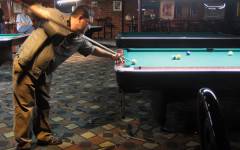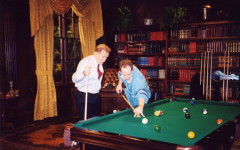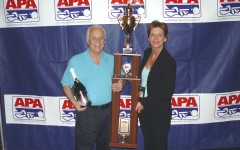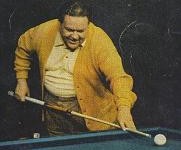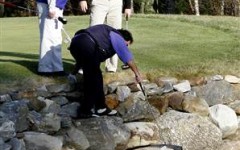Pool Hustler’s Handbook: How This Book Came to Be
Anthony Riniti on Friday, March 21st, 2014 Comments Off on Pool Hustler’s Handbook: How This Book Came to Be
Behind every great book, there is a great story. Nonetheless, this book has one too!
In the hit television show Boy Meets World, Sean Mathews played by Wil Friedel finds himself trying to pick up on a beautiful blond in a poolroom. She seductively asks, “Do you play?” Although he does not know the difference between a cuestick and a bread stick, he does what any reasonable person would do…he lies. “Of course I do. I am a Grand Champion.” What ensues will go as the funniest, yet most pathetic attempt at pool playing in the history of television.
With a huge crowd gathered to watch the “1978 Mexico City Champion”, there is a collective groan as Wil miscues and rips the cloth; screams of terror as a ball explodes, and cries of mercy as a ball is finally made only to have it defy gravity and jump back out of the side pocket.
Twenty for hours later, the room is dark. Wil is at the table accompanied only by the sixteen balls still on the table. The crowd, the blond, and his self-esteem are gone. Admitting defeat, Wil hap hazardously shoots the cueball, makes every ball on the table and then scratches in the corner pocket. With a shrug of his shoulders, he looks at the camera and says, “Just like Mexico City.”
I remember the scene, because I was the technical consultant for the pool scenes in that episode. After the taping, Wil and I were having a bite to eat and exchanging bar bets. Things like “I betcha I can drink this beer (I mean soda) without touching the glass.” Or “I betcha I can lift this plate using nothing but a plastic straw.” All of these proposition bets are simple tricks designed to make you look clever. Remember however, looks can be deceiving.
Then Wil said something that changed my life forever, or at least for the last ten years. He said, “Wouldn’t it be great if there was a book to teach you how to look like a great pool hustler. “That’s it” I screamed as an onion ring was launched across the room like Wil’s cuestick every time he tried to break the balls. “I will write a book which teaches the every day person how to hustle like a pro, even if you are not.” To this day, I am convinced had Wil known these shots; he would have got that girl.
The problem I immediately faced was how to differentiate between a trick shot and a billiard brainteaser. Literally any trick shot can be turned into a billiard brainteaser by simply saying, “I betcha I can…” So I thought if this is my book (and it is my book) I will define a billiard brainteaser as “any shot which requires some secret information to execute.” This limitation helped, but I still collected too many shots, which required skills possessed only by the pool gods, or at least the truly dedicated. To further weed out shots, I set the following criteria. All shots had to be:
1) Simple. Shots anyone could do with a little practice.
2) Deceptive. Puzzles, which seem impossible, unless of course you know the secret.
3) Practical. Shots that required little or no set up ahead of time.
Each shot will be rated in difficulty on a scale from one to five. One being shots that are so easy even Tom Cruise could make it. Five being the most challenging, yet still within the grasp of those with moderate pool skills. Every shot in this book is attainable with a little practice.
My original intention was to write the most comprehensive book ever written on the subject. Then reality set in. Actually my wife and two baby girls set in. After ten years of research, I realized new shots were being developed every day. This is the beauty of pool “trick shots,” the possibilities are only limited by your imagination. Just by modifying a classic shot or revisiting an age-old principle, you can develop an original trick shot. Once I was able to admit my omnipotent shortcomings, I settled on writing a book on fifty billiard brainteasers. To help boost my self-confidence, I have modestly named them The Fifty Best Billiard Brainteasers.
Some of the propositions are originals, while most are classics that have proven their worthiness by standing the test of time. In respect to the creators of these billiard brainteasers, thanks to the expertise of pool historians such as Robert Byrne, Mike Shamos, and Bill Marshall not to mention countless others, proper credit will be given to the best of my knowledge. However, since many shots are based on age-old principles and there is limited historical material on the subject, I apologize in advance if I fail to credit the right person. When I am unsure of its origin, I will acknowledge the person who first showed me.
Whether you are a beginner or a professional player, this book offers you a number of benefits. You will become empowered with pool skills and secret knowledge once left to only a select group. Let’s look at some of the benefits you will receive.
First, you will be able to win a friendly bet with your friends. Armed with the knowledge in this book, you may never have to pay for a drink again.
Second, since you know all of these clever shots, people will assume you are a highly skilled player, even if you are not. The same way people assume magicians are great poker players. You no longer will have to run and hide when someone asks you “Wanna shoot some stick?” Instead of playing a game, tell your opponent you have something interesting to show him. After three or four of these puzzles, your opponent’s next question will probably be, “Wanna play darts.”
Third, people of the opposite sex will be uncontrollably attracted to you. You will be able to date any person you want. That’s right, never again will you have a Saturday night without droves of people clawing after you. O.K., maybe that is far-fetched but you can use the knowledge learned in this book as a way to meet new people. You will instantly be the hit of the party, even without your lampshade.
Finally, you will protect yourself from some unscrupulous hustler. Inevitably, some shady character will want to bet you $50 that he can execute a shot that seems impossible. Once you have read this book, you will realize, regardless of how improbable these proposition bets appear, none are difficult if you know the secret. It is like my grandmother always told me, “The only difference between a man that can be had and a sucker is anyone can be had, but a sucker will bet you $50 that he can’t.” So if you learn nothing else from this book, always remember – Never Bet on Another Man’s Game.
The next time you find yourself trying to win a friendly bet, save face at the pool table, make new friends, or just to try to impress someone with your extensive knowledge of pool ball wizardry, don’t panic. You will not have to claim to be the Mexico City Champion. You will be able to leave with your ego in tact. Just show them a couple of your favorite billiard brainteasers and you too can hustle like a pro, even if you are not.
Here is a billiard brainteaser known as The Magic Squares and Triangles that will keep you thinking for a while. Place 16 balls in a tray such that each row of balls add up to 30 horizontally and vertically. (The cueball has no value) Also, place 15 balls in a triangle so each of the three sides add up to 40. The answers can be found in the back of the book. Good luck.
–Chef Anton. September 2001





